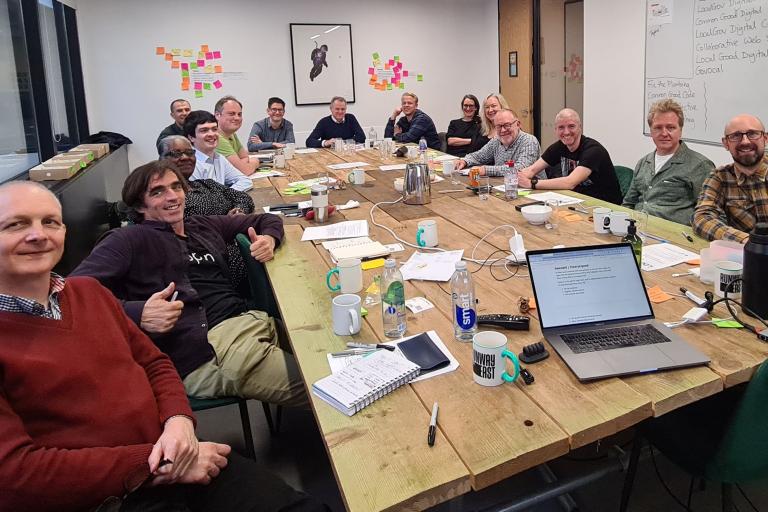We’re excited to announce that we’ll soon become a co-operative.
Our innovative new structure will help strengthen our collaboration and ensure our financial sustainability.
On November 16th we held our first ever in-person away day to discuss the next stage of the LGD project.
It was a day of in depth discussions and complex decision making, expertly facilitated by Doug from We Are Open and our Community Manager, Aaron. Thanks both.
Perhaps the most important decision we made on the day was to become a multi-stakeholder co-operative, a company structure every bit as innovative as our open source project.

Why we need to become a company
As many of you will know, from January 2023 we’ll no longer be funded by the DLUHC Local Digital Fund and will need to stand on our own.
To achieve this we need our own company. We’ve worked with business development specialists Nathan Brown and Mark Simmonds of Co-op Culture to find the best possible company structure, one that fits with our collaborative ethos.
Based on their work and discussions with our councils, Nathan and our Product and Tech Leads, Will and Finn, presented a proposal at the away day to establish the project as a multi-stakeholder co-operative.
This model gives councils and suppliers the opportunity to become members and owners, establishes a robust internal democracy structure and allows us to raise revenue in a variety of ways. This includes through charging memberships fees.
By asking for an annual membership fee, we’ll be able to cover all our costs and further invest in the distribution when our current funding runs out. Member dues are mandatory for Drupal suppliers and Supporting Partners. They’re voluntary for councils, and most have seen the value of chipping in so we can do more as a group.
What is a multi-stakeholder co-operative?
A multi-stakeholder co-operative is a co-operative with multiple classes of membership, each with a % of the overall voting rights. Classes are typically investor, worker and consumer (or customer), but can be whatever we choose to define in the company articles.
The articles of association will be based on the Co-operatives UK model rules, arranged to allow both councils and suppliers to be members with voting rights whilst also avoiding becoming a Regulated Company.
Our legal form
In our articles, the members will be councils and suppliers. Future options to explore include admitting future employees into membership, and/ or investors.
The company will be registered as a Company Limited by Guarantee and have an asset lock, put in place through the company articles. An asset lock ensures that the assets can never be cashed in by private individuals or companies for their own gain. The assets must always be used for a specific purpose.
How we made the decision
Like all big decisions in LGD we used the consent method to reach the decision.
This democratic process takes place in a series of ‘rounds’, where everyone gets a chance to speak, and a decision is reached if participants feel that the proposal is good enough for now and safe enough to try.
For our decision this worked as follows.
- The proposal was presented by Will, Finn and Nathan.
- Clarifying questions were asked by everyone to ensure they fully understood the proposal.
- Participants gave their reaction to the proposal
- Facilitators asked for critical concerns
Thankfully, after some thought provoking questions and erudite clarifications the proposal passed without any critical concerns
We are now one step closer to standing on our own two feet.
What’s next?
Also on the day we empowered Finn, Will and Maria (from Agile Collective) to establish the multi-stakeholder co-operative, and become the founding directors.
With the help of our Steering Group of councils and Nathan they will carry out the administrative task of setting up the business and then organise elections to the board of our new co-operative as soon as possible.
A new name
We also discussed a new company name.
The product will still be called LocalGov Drupal, but due to issues around trademarks we need a different name to register with Companies House.
We brainstormed some ideas and after a quick vote created a shortlist of three. We’ll be putting these final suggestions out to a vote on Slack in the coming days.
Some thank yous
We’d like to thank everyone who attended the away day and made it such an overwhelmingly positive experience.
Thanks to our council attendees:
- Jamie Dixon, Wirral Council
- Will Callaghan, Greenwich Council (and LocalGov Drupal Product Manager)
- Keelan Fadden-Hopper, Essex County Council
- Angie Forson, Croydon Council
- Hannah Brunt, Waltham Forest Council
And to those from suppliers and contractors:
- Tim Hunt - Data Content Reach (and LocalGov Drupal Comms Lead)
- Mark Conroy - Annertech
- Maria Young - Agile Collective
- Finn Lewis - Open Code (and LocalGov Drupal Tech Lead)
- Chris Morton - Plan Alpha
- Jamie Garrett - Invuse
- Paul Jenkins - Big Blue Door
- Matthew Wilkes - Nomensa
- Colin Sherry -Webcurl
And a special thank you to our facilitation team of Doug Belshaw, Nathan Brown and Aaron Hirtenstein whose diligent preparation ensured the day ran smoothly.